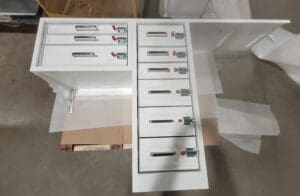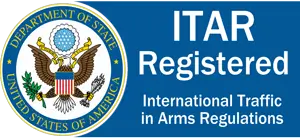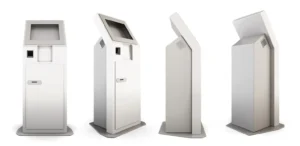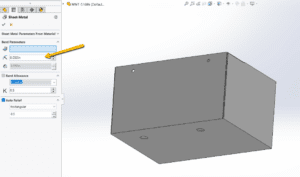Last updated on July 30th, 2024 at 10:06 am
A certificate or registration can speak volumes in precision sheet metal fabrication, assuring customers that a shop offers top-quality services. Here’s a roundup of which ones you can expect when you work with Approved Sheet Metal (ASM).
Table of Contents
- 1 1. ISO 9001:2015 Certification
- 2 2. ITAR Registration
- 3 3. Material Certification
- 4 4. First Article Inspection
- 5 5. Certificate of Conformance
- 6 At ASM, We’re Obsessed with Quality
- 7 Custom Precision Sheet Metal Certifications and Inspection Reports FAQ
- 7.0.1 How Can I Set up the FAQ Module?
- 7.0.2 What is ITAR registration and why is it important for ASM?
- 7.0.3 What is a material certification and what details does it include?
- 7.0.4 What is a First Article Inspection (FAI) and how does it benefit the customer?
- 7.0.5 What is a Certificate of Conformance (CoC) and why is it necessary?
1. ISO 9001:2015 Certification
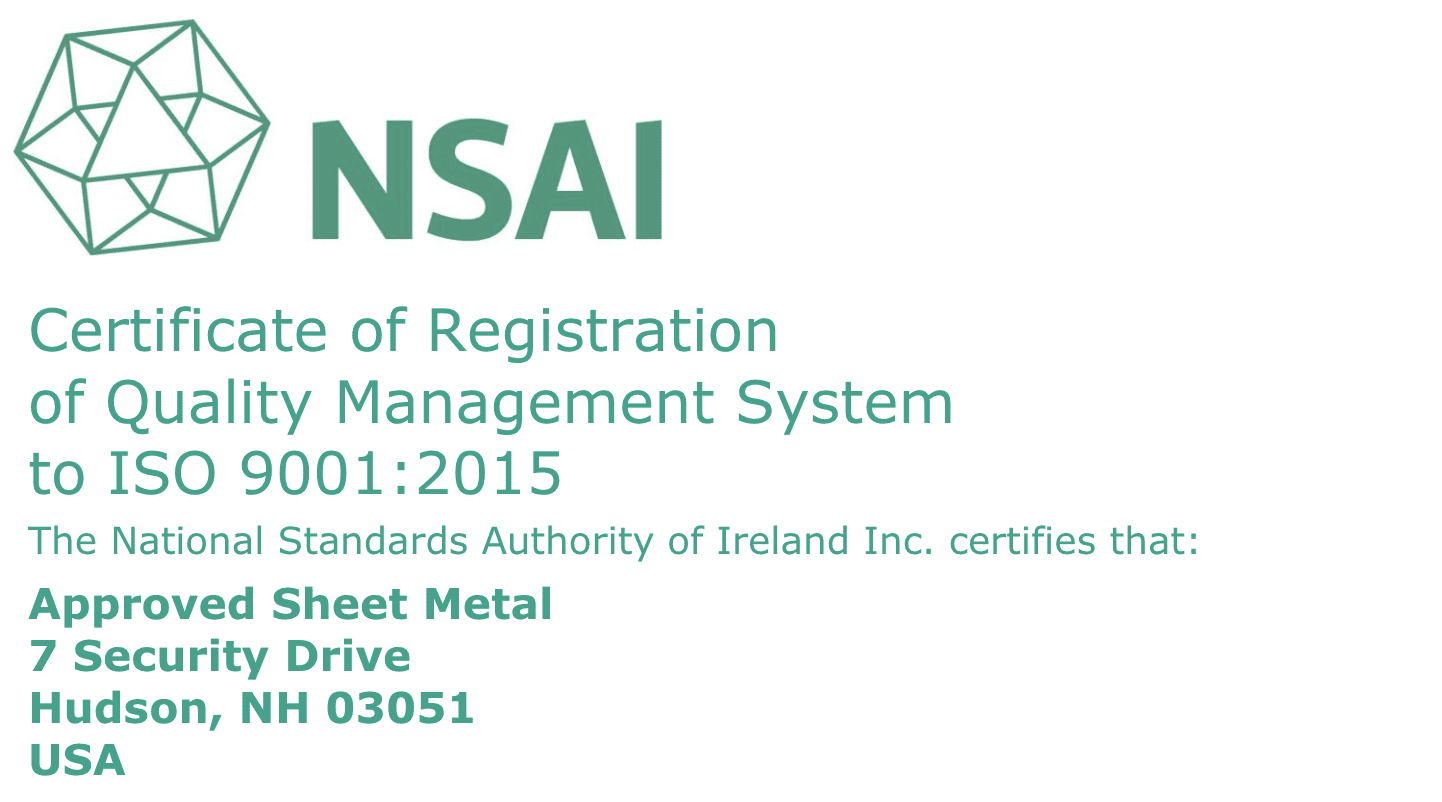
The bottom line: ISO 9001:2015 certification enables us to fabricate parts for original equipment manufacturers (OEMs) and other customers in highly regulated industries like aerospace, defense, and medical.
What is ISO 9001:2015?
The International Organization for Standardization or “ISO” does exactly what its name suggests: sets international standards. ISO’s most updated global standard for quality management is 9001:2015.
To remain certified to the ISO 9001 standard, ASM must “establish, implement, maintain, and continually improve” a Quality Management System (QMS): a robustly documented system of processes for achieving and elevating quality.
How do you benefit from our ISO 9001:2015 certification?
Our QMS outlines processes for everything that happens in the ASM facility. From safety gear to suppliers, from customer communications to tool management, we account for every action, large and small, that contributes to the quality of our products and services.
Because we’ve standardized every shop step from design through delivery, you can count on consistently high-quality from the ASM team, with precision sheet metal components that blow your expectations out of the water.
Our ISO 9001:2008 Certification
2. ITAR Registration
The bottom line: ASM is required by law to be ITAR registered and compliant because we manufacture components for specific defense-related applications that appear on the United States Munitions List (USML).
What is ITAR?
ITAR (International Traffic in Arms Regulations) legislation was written to safeguard sensitive technologies and data from getting into the wrong hands.
ITAR compliance demands that we never share items on the USML with anyone other than US personnel. National security is at stake, and defense contractors who violate ITAR face massive civil and criminal fines and even prison time.
To become ITAR registered, ASM provided the Directorate of Defense Trade Controls (DDTC) with comprehensive details about our business, its operations, and our ITAR Compliance Program.
How do you benefit from our ITAR compliance?
ITAR registration signals that ASM is approved to fabricate parts for your defense applications. ASM’s regulatory compliance makes our precision sheet metal shop a trustworthy partner at any point in your OEM’s supply chain.
3. Material Certification
The bottom line: A material certification validates that you’ve chosen the right material for your project’s requirements and provides documented traceability from mill to end user.
What is material certification?
You may also see material certification referred to as a “material test report (MTR)” or a “mill test certificate (MTC).” By any name, your material certification document should include the mill’s quality control approval and bear an official stamp.
Look for these details on your material cert:
- Type
- Grade
- Chemical composition
- Mechanical properties
- Industry standards compliance (ASTM, AMS, etc.)
- ISO compliance
- Test results
- Production country
How do you benefit from a material certification?
The higher the quality of your raw material, the higher the quality of your precision sheet metal parts. With a material certification, OEMs of every size and specialty are equipped to demonstrate compliance with stringent industry and regulatory standards, ensure limited liability from end-user quality claims, and confidently tout their products' safety and reliability.
4. First Article Inspection
The bottom line: During a First Article Inspection (FAI), we assess how closely your newly fabricated part (or parts) meets your specifications. Then, we document our findings in a detailed FAI Report (FAIR).
What is a First Article Inspection?
The comprehensive FAI is specifically intended for a production’s first part or batch of parts. To perform an FAI, we evaluate the part’s engineering documentation and manufacturing processes for consistent results that conform to the agreed-upon requirements.
The resulting FAI Report incorporates documentation regarding these part details:
- Raw materials
- Conversion processes
- Special processes
- Functional testing
How do you benefit from a First Article Inspection?
Because the FAI highlights any discrepancies early on, it allows us to correct issues long before they become serious problems. ASM’s thorough First Article Inspections reveal optimization opportunities, reduce recall risk, minimize production delays, and promote product quality.
FAI bonus tips
- Provide a 2D CAD blueprint. Remember to provide ASM with your part’s fully dimensioned drawing if you require an FAI.
- Request a sample. If you don’t need a report, and you only need a “first article” for your own in-house inspection, don’t ask for an FAI; instead, ask for a “first part sample.”
5. Certificate of Conformance
The bottom line: Many businesses require a Certificate of Conformance (CoC) as a default step in the procurement process. For those in aerospace, defense, healthcare, and other highly regulated industries, the CoC verifies compliance with national and global standards. As a manufacturer, ASM is authorized to provide these certificates to our fabrication customers.
What is a Certificate of Conformity?
The CoC’s authenticity derives from the First Article Inspection and Report. Also called a Certificate of Conformity or a Certificate of Compliance, the CoC defines these details:
- Part description
- Quantity of parts
- Manufacturing date
- Relevant specifications and standards
- Inspection and testing results
A CoC from ASM serves as evidence that your precision sheet metal parts meet all the agreed-upon requirements and quality standards.
How do you benefit from a Certificate of Compliance?
OEMs that use precision sheet metal components trust the CoC to authenticate the integrity of their final products. With certification that your ASM parts meet all legal, safety, traceability, and conformity criteria, you can stay focused on the work you do best.
At ASM, We’re Obsessed with Quality
Our certifications and registrations aren’t mere badges of honor. They’re the natural extension of our team’s dedication to quality you can touch, see, measure, and certify.
We’ve always viewed quality as an all-in achievement that demands the best of every person in our shop. That’s why we follow proven processes, honor security protocols, partner with vetted suppliers, inspect to the highest standards, and pursue continuous improvement: so we can show up every day and do even better work than the day before.
Custom Precision Sheet Metal Certifications and Inspection Reports FAQ
You can drag-and-drop it like any other Beaver Builder module. Then add all your questions with respective answers. That’s it! You can then customize the FAQ section with design settings.
ITAR (International Traffic in Arms Regulations) registration is mandatory for companies that manufacture components for defense-related applications on the United States Munitions List (USML). ITAR compliance ensures that sensitive technologies and data are protected and only shared with authorized US personnel. ASM’s ITAR registration demonstrates their capability to securely handle defense projects, making them a reliable partner in the defense supply chain.
A material certification, also known as a material test report (MTR) or mill test certificate (MTC), validates the quality and suitability of materials used in a project. It includes information such as material type, grade, chemical composition, mechanical properties, compliance with industry standards (e.g., ASTM, AMS), ISO compliance, test results, and the production country. This certification ensures the highest quality of raw materials, contributing to the reliability and safety of the final products.
A First Article Inspection (FAI) involves assessing the first part or batch of parts produced to ensure they meet specified requirements. An FAI Report (FAIR) documents details such as raw materials, conversion processes, special processes, and functional testing results. This thorough inspection helps identify discrepancies early, allowing for corrections before full production, thereby reducing risks of recalls, minimizing production delays, and promoting product quality.
A Certificate of Conformance (CoC), also known as a Certificate of Compliance, verifies that a product meets all agreed-upon requirements and quality standards. It includes details such as part description, quantity, manufacturing date, relevant specifications, and inspection/testing results. The CoC provides OEMs with assurance that their precision sheet metal components comply with national and global standards, ensuring the integrity of their final products in highly regulated industries like aerospace, defense, and healthcare.

